Passport to Taiwan
There are literally hundreds of street fairs in New York City. But of them all, only one stands out for me.
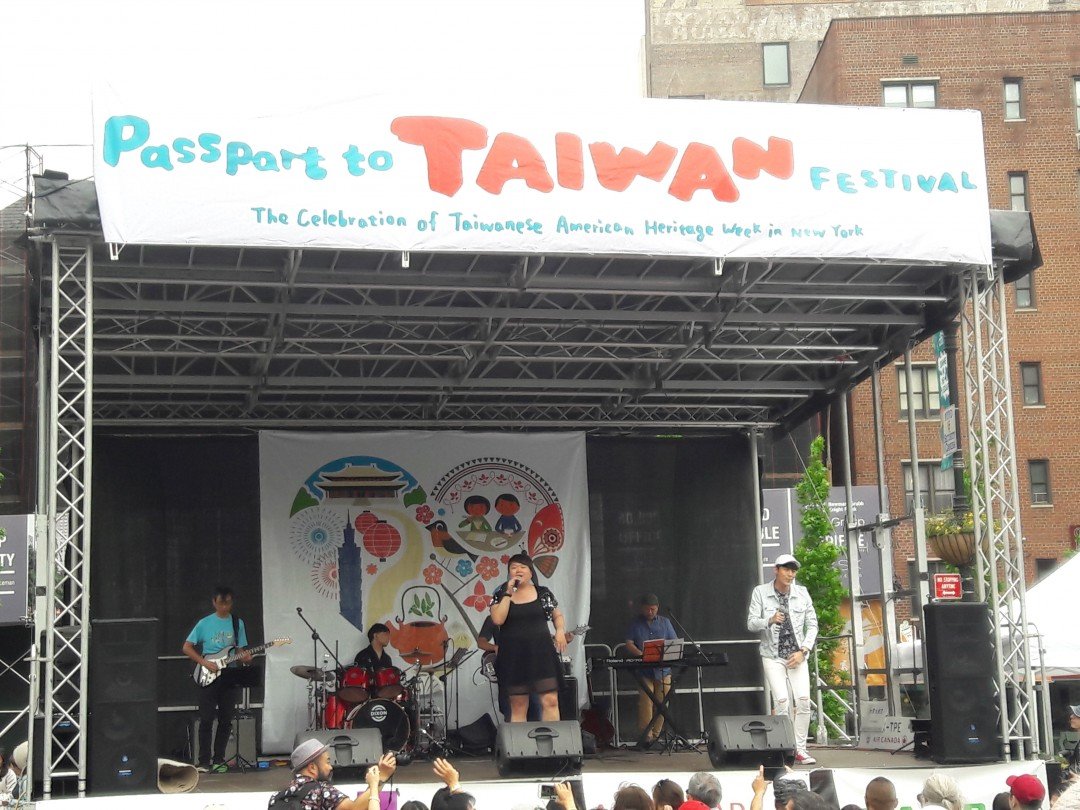
Every third Sunday of May for over a decade held in Union Square, there is a great event whose goal is to create exposure and to increase mainstream awareness for a territory in Asia that has long been maligned with confusion and suppressed of its independence for many decades by the People’s Republic of China.
This event is called Passport to Taiwan, and it is a joyous outdoor festival replete with the brightest bands and entertainers from Taiwan performing onstage, with long lines of hungry pedestrians anxiously waiting on busy stalls of culinary chefs cooking the most delicious street food indigenous to the various regions of the country.
The olfactory smells and native sounds in the background truly amalgamate into a euphonious concoction of the senses. While the temperate late May breeze feels refreshing on the skin, and provides a cooling respite to the midday sun.
On a more sobering note, this annual celebrated occasion serves as a reminder to us all of the sad plight of Taiwan throughout its convoluted political history throughout the 20th Century to the present.
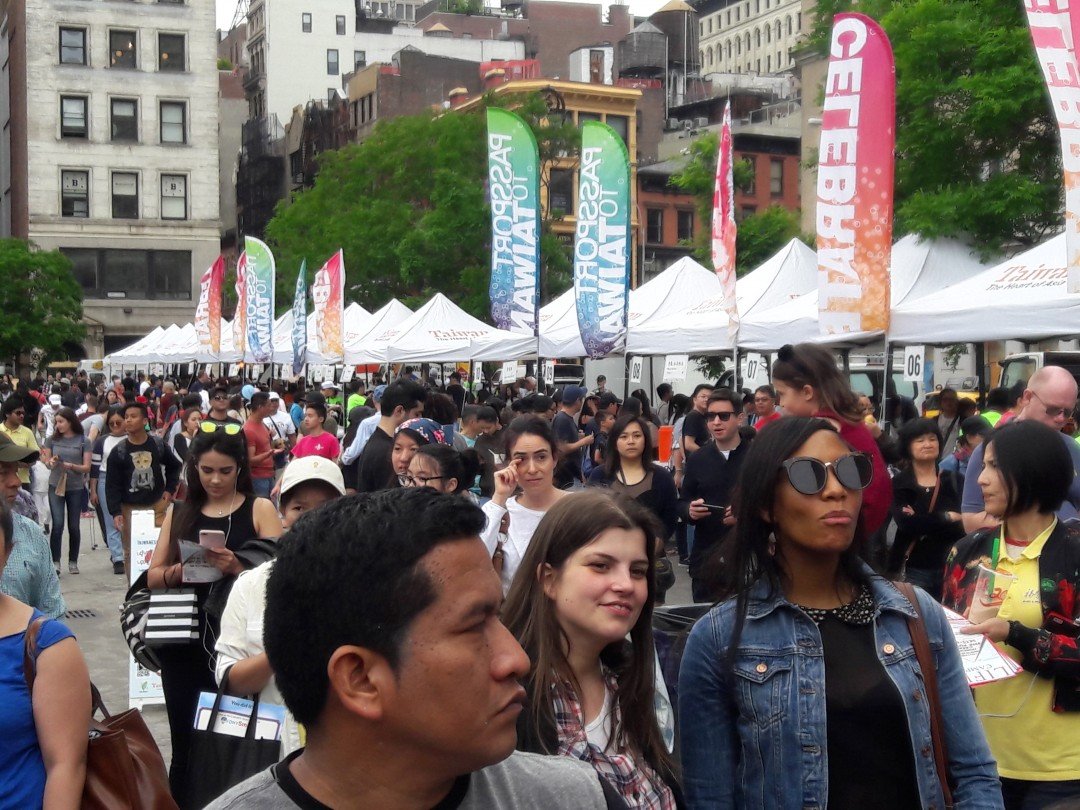
However for most New Yorkers like me, this festival represents the tremendous resilience of its people, and an unwavering and incessant demonstrative pride that Taiwanese Americans continue to harbor for their motherland which are manifest through an ongoing proactive fight and continuous strides toward recognition of independence.
Recent News in Taiwan
There has been jubilant news in Taiwan recently, as on May 24 the High Court has struck down the rule that marriage be strictly defined only between men and women. Hence, the LBGTQ community have won an inspiring victory, as Taiwan has become the first nation in Asia to legalize gay marriage.
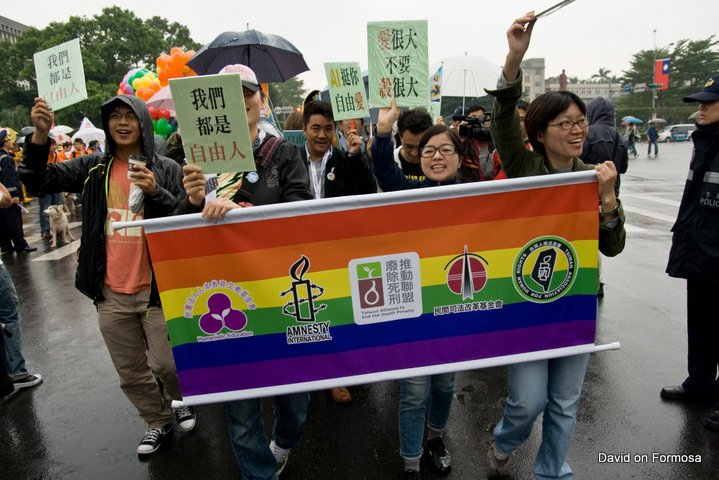
This should come as no surprise, as Taiwan has been the forerunner in Asia for the past 20+ years on a number of progressive fronts. The following is only to name a few.
Taiwan holds a progressive political agenda and is a small nation with a BIG impact on the world:
1) Taiwan is the 10th largest trading partner of the United States
2) Taiwan became the first nation in Asia to legalize gay marriage in 2017.
3) Currently 38% of Taiwan’s legislators are women
4) Taiwan has among the best National Healthcare systems in the world for providing access since 1995
5) Taiwan has one of the highest recycling rates in the world with 55% (United States is 35%)
6) Taiwan’s First direct presidential election was held in 1996
7) Taiwan’s first woman president Tsai Ing-Wen was elected in 2016
8) Taiwan boasts the largest LGBT Parade in Asia
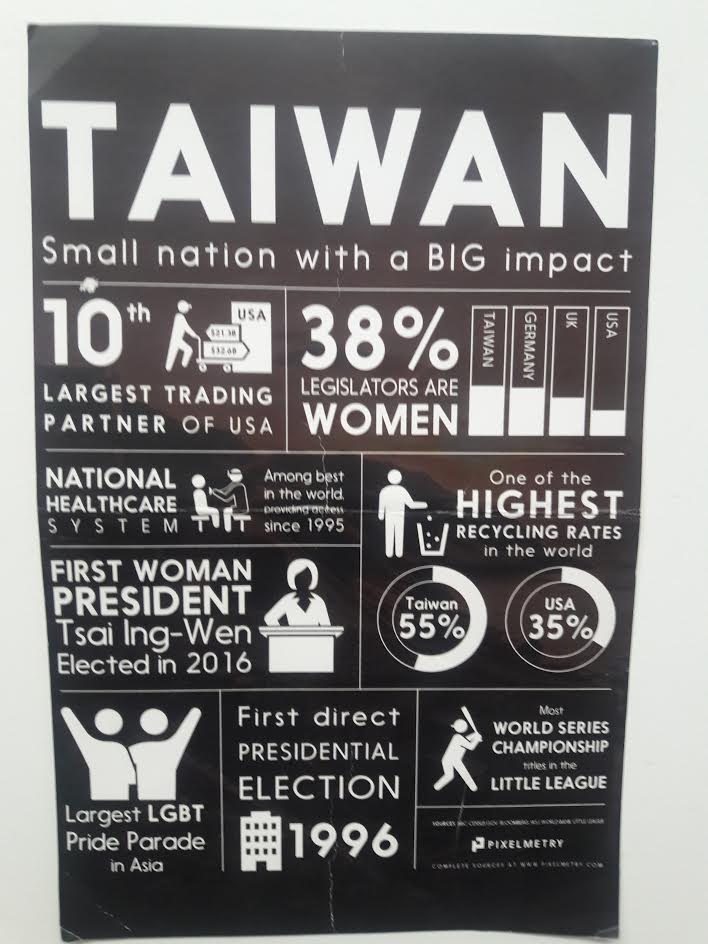
Yet for all of Taiwan’s enormous contributions to the world and the great pride of their people, their insensible relegation by the People’s Republic of China since the end of World War II and the lack of recognition of their independent sovereignty from China and from most of the rest of the world has caused a tremendous indignity to their people.
According to Wikipedia, 22 countries or entities currently have full diplomatic relations with the Republic of China (Taiwan).
Today, Taiwan is still not recognized by the United Nations Council as an independent sovereignty and its membership to the U.N. continues to be blocked by the People's Republic of China, although Taiwan has had its own independent government, their own currency, their own military, and has had direct presidential elections since 1996.
A Brief History of Taiwan since the Late 19th Century
Since the end of the 19th century, the history of Taiwan has been a convoluted one mired in political controversy.
The Japanese governed Taiwan from 1895-1945 when Taiwan was ceded to Japan from China in the Treaty of Shimonoseki. This treaty was the end result of China being defeated by Japan during the First Sino-Japanese War from 1894-1895.
Taiwan would remain a colony of Japan until 1945. As a result, most of the older generation native Taiwanese who were born during this period continue to speak Japanese in their households as a first language.
Here is a Brief History of Taiwan from 1945 to 1987:
The Kuomintang (KMT), the Nationalist Chinese Party led by Chiang Kai-Shek, was defeated by the Chinese Communist Party (CCP) in an internal powerful struggle within China called the Chinese Civil War, and subsequently were forced to leave China.
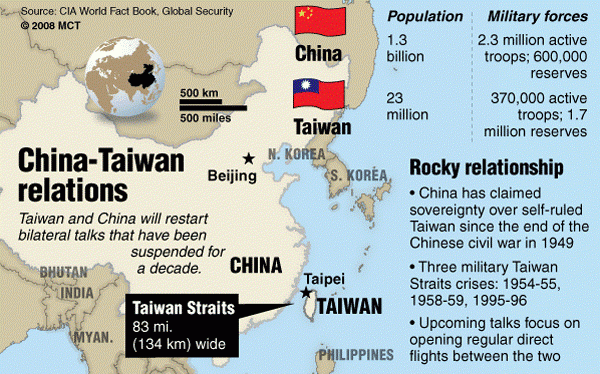
This allowed the Communist Party of China to declare the establishment of a new Chinese state: the People's Republic of China (PRC). The Republic of China (ROC) which is the governing structure created by the KMT remained.
While the civil war was going on in China, the Allied forces led by the United States, defeated the Japanese in World War II, who subsequently upon surrender had to give up their claim of Taiwan to the Allied Forces.
As a result of these concomitant historical events, the Allied forces who supported Chiang Kai-Shek and the Nationalist Chinese Party or “Free China” gave permission for the KMT to temporarily occupy Taiwan.
Immediately upon the Japanese surrender of Taiwan in 1945, the KMT began its occupation of Taiwan. Between the Japanese surrender of Taiwan in 1945 and April 1946, the Republic of China military forces repatriated 90% of the Japanese living in Taiwan to Japan.
By the end of 1949 when Chinese Communist Party (CCP) had defeated the KMT, Chiang Kai-Shek and the remainder of the KMT fled to the island of Taiwan.
Thus the CCP became the People’s Republic of China (PRC), and ruler Chiang Kai-Shek’s Nationalist Chinese Party now transplanted to Taiwan (and retaining its ROC governing structure) both co-existed as two independent governing autocracies.
Although sanctioned by the Allied Forces after World War II as a “temporary retreat”, Taiwan eventually became the permanent home of Chiang Kai-Shek’s Nationalist Chinese Party (KMT) as a result of his autocratic rule.
Shortly after transplanting his Nationalist Chinese Party and its governing structure the ROC to Taiwan in 1949, ruler Chiang Kai-Shek would impose a strict Martial Law that would last until 1987.
Under martial law the KMT ruled Taiwan with the stated goal of being vigilant against Communist infiltration and preparing to retake mainland China. Therefore, any political dissent was not tolerated.
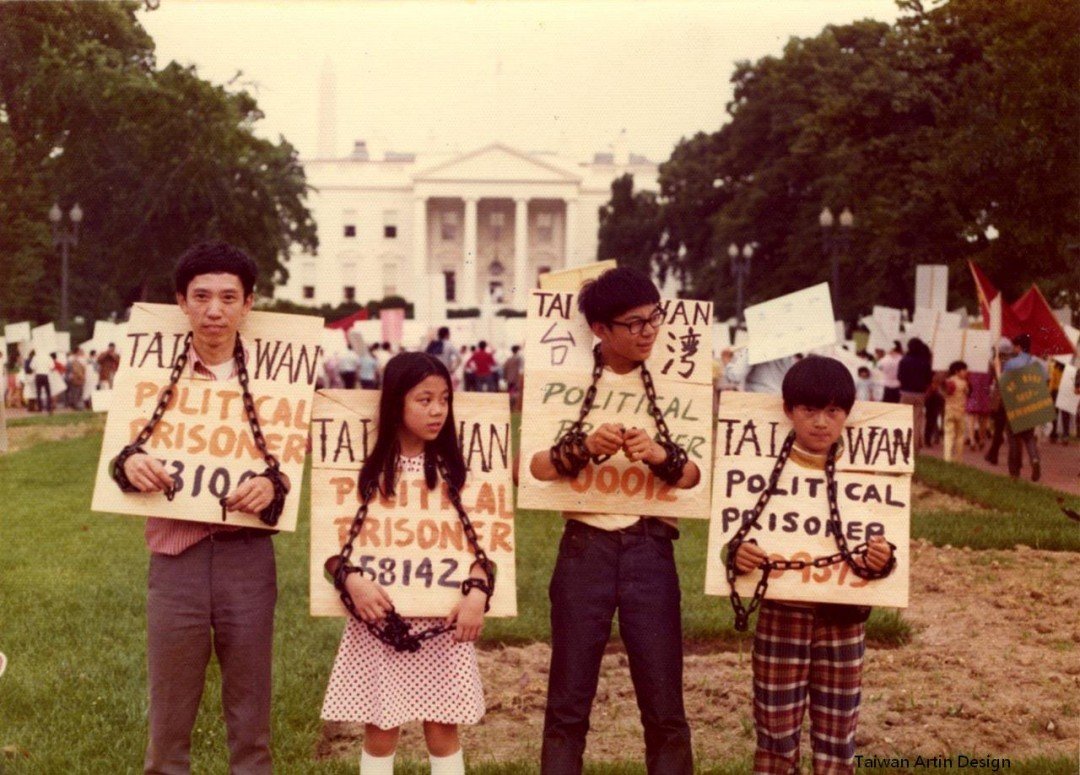
After the Martial Law was placed into effect, many Taiwanese became victims of the political repression known as the White Terror. From 1947 to 1987, tens of thousands of Taiwanese were imprisoned and at least 1,000 were executed, most in the early 1950s, after being accused of spying for Communist China.
During the period from the 1960’s through the late 1980’s, Taiwan families often were splintered from other family members. Usually the men would be granted special visas and used them to flee abroad to America to seek a better life away from the KMT. Meanwhile, the wife and the children often were forced to remain in Taiwan. Sadly, far too many times these families were never able to reunite.
Taiwan: The Turbulent Period from 1970’s through the late 1980’s
Until the early 1970s, the Republic of China (ROC) was recognized as the sole legitimate government of China by the United Nations and most Western nations, refusing to recognize the People's Republic of China (PRC) on account of the Cold War.
However by the early 1970’s, Taiwan faced setbacks in the international sphere. In 1971, the ROC government walked out of the United Nations shortly before it recognized the PRC government in Beijing as the legitimate holder of China's seat in the United Nations.
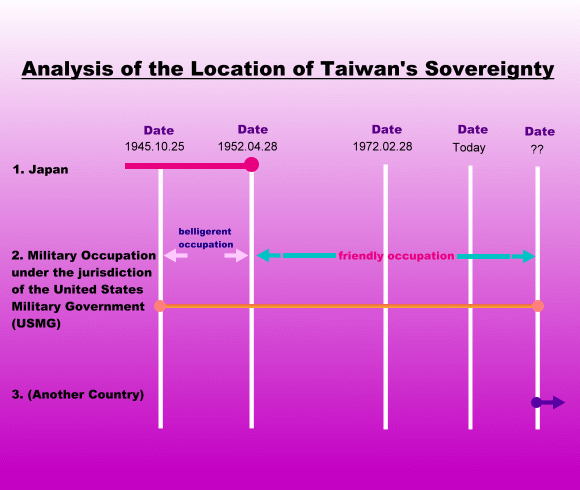
The ROC had been offered dual representation, but Chiang Kai-shek demanded to retain a seat on the UN Security Council, which was not acceptable to the PRC. Chiang expressed his decision in his famous "the sky is not big enough for two suns" speech.
In October 1971, Resolution 2758 was passed by the UN General Assembly and "the representatives of Chiang Kai-shek" (and thus the ROC) were expelled from the UN and replaced as "China" by the PRC. In 1979, the United States switched recognition from Taipei to Beijing.
It was the late 1970s and early 1980s that represented a very turbulent time for the Taiwan-born as many of the people who had originally been oppressed and left behind by economic changes became members of Taiwan's new middle class.
Taiwan’s Move toward Democracy
With the death of Chiang Kai-shek in April 1975 at the age of 87, the new leadership of Taiwan succeeded the presidency to Yen Chia-Kan, who elected his son Chiang Ching-Kuo as the successor to the leadership of the KMT.
Formerly the head of the feared secret police, Chiang Ching-Kuo recognized gaining foreign support to securing the ROC's future security required reform. His administration saw a gradual loosening of political controls, and a transition towards democracy. As a result, opponents of the Nationalists were no longer forbidden to hold meetings or publish papers.
However, with the demise of the KMT single-party system and the democratization movement during the 1980s, the martial law was eventually lifted in 1987 and provisions were eventually rescinded in 1991.
A constitutional democracy was eventually restored in the ROC after 1987. Free enterprise has since allowed native Taiwanese to gain a powerful bargaining chip in their demands for respect for their basic human rights.
Looking to Taiwan’s Future
What I have discoursed here is only the tip of the proverbial iceberg. Hopefully one can now understand how Taiwan’s convoluted political history has affected both native Taiwanese and Taiwanese Americans, causing so many to experience such deep feelings of indignity and isolation from the world, and a continued feeling of marginalization from the People’s Republic of China (PRC).
To this day, both the native Taiwanese and Taiwanese Americans although saddened by the past, have become emboldened through successive generations and have developed a feeling of great empowerment and sustainability for their cause.
The Sunflower Student Movement of April 2014 in the Legislative Yuan in Taipei is a testament to their fight for the cause. Much progress has since been made toward the recognition of Taiwan as an independent sovereignty and the fight continues.
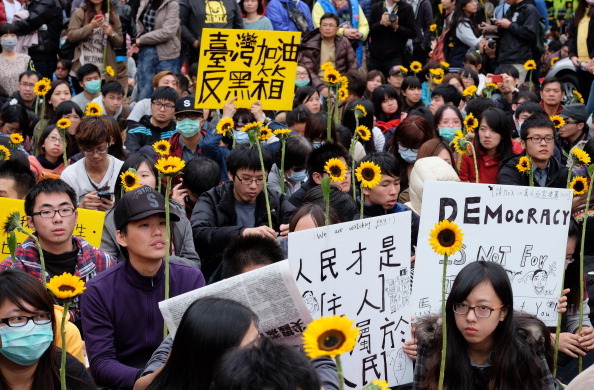
Passport to Taiwan in New York City’s Union Square salutes the Taiwanese American community’s inner strength and intestinal fortitude to these continual challenges. It provides us all a reminder of the strength of the human spirit.
Thank you for reading, and any of your comments regarding this article would be greatly appreciated.
Cheers,
Kaju
Join FREE & Launch Your Business!
Exclusive Bonus - Offer Ends at Midnight Today
00
Hours
:
00
Minutes
:
00
Seconds
2,000 AI Credits Worth $10 USD
Build a Logo + Website That Attracts Customers
400 Credits
Discover Hot Niches with AI Market Research
100 Credits
Create SEO Content That Ranks & Converts
800 Credits
Find Affiliate Offers Up to $500/Sale
10 Credits
Access a Community of 2.9M+ Members
Recent Comments
59
Very good and interesting article Kaju.
Thumbs up for Taiwan! A good progress, there are still too many countries which have to do the same. I think we are half way on the road where humanity realizes we are all equal and come from the same source.
Greetings from the south of Spain, Taetske
I hope this Taiwan article provided an important history lesson, Taetske, a lesson still in the making today..
The struggles for Taiwan to be seen as a sovereign nation continue. Although we are now in 2017, it seems there is still a looming remnant of "white terror" existing in Taiwan.
As we speak, there are still 1000s of ballistic missiles pointed at Taiwan from PRC.
Yes, I am with you 100% Jimmy. Taiwan has my heart. What a long complex struggle it has been. My good friend, a Taiwanese American has made a film about Taiwan's plight called "Blacklist." When she thinks about what her family went through, she breaks down and cries.
Didn't read all of it, have you ever thought of writing a book? Or place your knowledge on Wikipedia?
Its a wonderful compliment coming from you, Loes. Thank you!
Glad you brought this up. The answer is, YES I am currently working on doing both.
I am slowing compiling material to (hopefully) self-publish an
e-Book, - ans funny you mention it - am trying to figure out and recently wrote posed a question to the WA community on how to pass approval for Wkipedia:
How do you create a wikipedia page that passes approval? I sure could use yours and everyone's advice here on this.
Thank you Dr. C, its a very complex topic and I've only barely scratched the surface here. If you go back further than the 19th century, OMG!
Great and very interesting article, Kaju. I didn't know much of this information. Thanks for sharing!
I appreciate the read Julie and glad you learned something. My significant other is Taiwanese American, so I have a strong empathy and understanding of the struggle.
I was just at Passport to Taiwan this Sunday.and it is a wonderful event.
See more comments
Join FREE & Launch Your Business!
Exclusive Bonus - Offer Ends at Midnight Today
00
Hours
:
00
Minutes
:
00
Seconds
2,000 AI Credits Worth $10 USD
Build a Logo + Website That Attracts Customers
400 Credits
Discover Hot Niches with AI Market Research
100 Credits
Create SEO Content That Ranks & Converts
800 Credits
Find Affiliate Offers Up to $500/Sale
10 Credits
Access a Community of 2.9M+ Members
Do you know that I was living for more than 10 years on Taiwan, Kaju?
You did a great post about Taiwan!
BTW: Do you know that Chiang Kai-Shek and MaoTse Dong had were related through their wifes?
There are plenty of stories to tell, which makes the wild west look ver tame. :)
Wow Eric, thank you for sharing this ! I appreciate this great compliment! This is a topic very close to my heart.
The reason this is so close to me is that my significant other is a Taiwanese American who is the biographer of the Taiwanese nonagenarian radical dissident Su Beng. The book is epic and a work in progress.
She also has been doing a podcast called "Talking Taiwan" for the past 5 years. And it continues to this day.
Su Beng is known best for plotting to bring down the KMT by palnning an assasination of Chiang Kai-Shek in the late 1940's, and upon the KMT's discovery of his plot subsequently fled to Japan where he lived for 40 years and wrote his seminal work "400 Years of the History of Taiwan."
Su Beng eventually returned to Taiwan in 1993 after Martial law was lifted, where she has personally interviewed him many times since.
You are inspiring me to write more about this very important topic, so many stories to teel, and YES these all make the West look tame!
I had absolutely NO IDEA that Chiang Kai-Shek and MaoTse Dong were related through their wifes. I will have to tell her about that interesting trivia gem!
Yes they were related. Not in direct line, but through the family of the founder of modern China, Dr. Sun Yat Sen.
I was in Taiwan during that changing period. I still remember marshal law and how every important place and bridge were guarded by the military. I also was in Taiwan during the transition time after the end of martial law. Within weeks it became very dangerous. There were shootings everywhere. In the end a former General was made Prime minister and it started to quiet down. Actually Taiwan is the only country I know, which successfully (with some smaller turbulences of course) made the transition from a dictatorship to democracy.
Eric, what an experience you lived through my friend! Unbelievable.
I can only imagine what the feeling was like walking by armed guards everyday, and what the tension was living there in the "danger zone" right after martial law was lifted.
And both related through the founder of modern China, Dr. Sun Yat Sen? Talk about a family "feud."
You are totally right, I cannot think of another country that successfully transitioned from a dictatorship to democracy. I would have to think about it. Perhaps there were some small countries in Africa, but that I'd be hard-pressed.